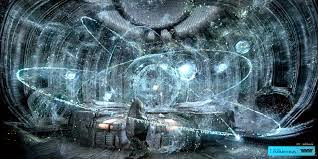Two similar but distinct hypotheses:
(i) that our space-time continuum is just one of many such continua distributed along a fourth spatial dimension;
(ii) that, within our continuum, every random event or conscious choice causes a bifurcation such that divergent timelines proliferate in a second temporal dimension.
Both hypotheses involve many universes and at least one extra dimension. However, (i) involves many permanently distinct and self-sufficient universes whereas (ii) involves a single universe continually splitting into increasingly dissimilar alternative versions of itself. In (ii), another universe might contain, e.g., a World War II won by the Axis whereas, in (i), World War II - and indeed the entire history of Earth, the Solar System and the Milky Way - occur only in our universe. (ii) has "parallel Earths" whereas (i) has only one Earth. A variation on (ii), as expounded by Valeria Matuchek in Poul Anderson's A Midsummer Tempest, is that the diverse universes have been distinct from the beginning but their differences did not become apparent until later.
Olaf Stapledon's Star Maker experimentally creates many increasingly complex universes, including ours. Thus, Stapledon presents (i) but not (ii). HG Wells, as he did with several key concepts, presented (ii) in a single novel. Several subsequent sf writers have, as we know, endlessly elaborated (ii). However, I think that (i) must also be present somewhere in Anderson's vast body of work?

3 comments:
Hi, Paul!
This is only off the top of my head, but I think THREE HEARTS AND THREE LIONS begins with Holger Carlsen and a fellow engineer attending a lecture by a British polymath who speculated about alternate universes. Possibly along the lines of your alternative 1.
Sean
Sean,
Anderson probably mentioned such a lecture to prepare the reader for what was to come.
Paul.
Hi, Paul!
Exactly! It was an example of what is called in science fiction an "info dump." And Poul Anderson was able to integrate these sometimes awkward lumps of information more smoothly into his stories than other writers might have done.
Sean
Post a Comment